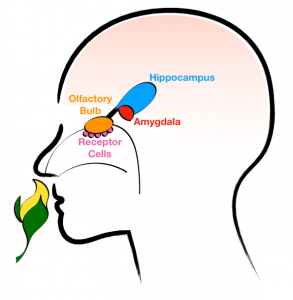This post is also available in Dutch.
A familiar smell can evoke intense memories, whether pleasant or traumatic. How can a hint of perfume transport us back to a special time and place in the past?

I stroll along a beach as the cool sea mist grazes my cheeks, the roar of waves crashing against the shore rings in my ears—but nothing stops me in my tracks like the thick indefinable aroma of ocean, seashells, sand, and wind. In the blink of an eye I’m 12 years old again, gleefully boogie boarding through cold waves and scooping droves of floppy jellyfish into a bright yellow bucket. For many people, odors can be powerful cues that elicit memories of what, when, and where (episodic memories). As humans, we rely most heavily on our sense of sight, but what is it about our sense of smell that triggers specific, vivid memories and emotions?
An aroma is first detected by smell receptors in the nose which connect to the olfactory bulb, which in turn has strong, direct connections with the brain’s centers for emotion (amygdala) and memory (hippocampus). These brain areas identify odors and access memories to help us recall people, places, or events linked with certain scents. The close physical connection between brain regions of memory, emotion, and olfaction may explain why we learn to relate a smell with certain emotional memories. Information about visual, auditory and tactile cues do not pass through the same parts, explaining why only a smell can activate emotions and memories.
Most recently, one study found that the anterior olfactory nucleus may be responsible for how space, time, and odor are integrated into an episodic smell memory. Neuroscientists have also shown that memories triggered by an odor cue (e.g. scent of a rose) were correlated with greater fMRI activity in the limbic system (including the hippocampus and amygdala) than those triggered by a word cue, like the word “rose”, and that odor memories correlate with more brain activity even in areas associated with visual intensity. An earlier study found that different people can have varying emotional responses to scents that are chemically identical; what you think you’re smelling affects your response to an odor. Subjects rated an odor as more pleasant when it was presented with a positive label (e.g. “parmesan cheese”), rather than with a negative label (e.g. “vomit”).
Unfortunately, smells can also effectively produce negative flashbacks, especially in individuals with posttraumatic stress disorder (PTSD). Several studies have investigated the link between odor and emotional processing in PTSD patients. The association between scent and memory can be exploited in the clinical setting by using odors for their grounding effects, as well as in augmented exposure therapy. Furthermore, the robust connection between smells and remembering has valuable implications for learning and recalling information. Researchers have discovered that scents can be associated with facts or information for improved future recollection. Even now, neuroscientists are continuously trying to figure out how they can take advantage of our smell memory abilities.
Although there is much to learn, the future smells good!
Written by Christienne Gonzales Damatac
Edited by Annelies van Nuland
Translated by Felix Klaassen
